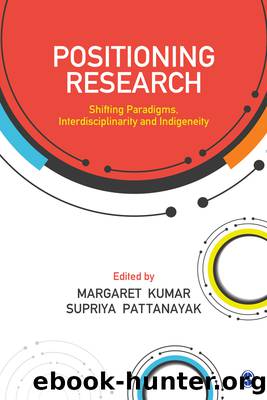Positioning Research by Kumar Margaret;Pattanayak Supriya;

Author:Kumar, Margaret;Pattanayak, Supriya; [Pattanayak, Margaret Kumar Supriya]
Language: eng
Format: epub
Publisher: SAGE Publications India Pvt, Ltd.
Published: 2018-02-16T00:00:00+00:00
Education, Research and Language
Following Freireâs (1986) much acclaimed Pedagogy of the Oppressed, wherein he notes that the oppressed have a âculture of silenceâ; likewise, knowledge systems and indigenous methodologies have also been devalued as they do not have important proponents and spokespersons. Much has been said about decolonizing methodologies (Tuhiwai Smith 2012) but in education practice, efforts at incorporating local/indigenous languages and philosophies have been fragmented. When one discusses the âdiscourse genreâ in education, first, one questions, which/ whose âdiscourseâ and which one is privileged over others (written texts alone or oral presentations). Which âgenresâ would be the next questionârecognize those that help them to create their own texts, written or oral or assume that genres represent a fixed category, leading to a mechanistic teaching and learning. One also should take into account the fact that some tasks that are set in classrooms make unwarranted assumptions of certain studentsâ cultural knowledge and understanding, thus disadvantaging them. Genres should not be conceptualized in a static manner, and the way they are taught may lead to oversimplification, especially if they are taught as discrete categories in a linear fashion. When one discusses âwhose realityâ, there are many interpretations which may prove to be confounding to the researcher. The constructionists note that there is an external reality but language and discourse powerfully shape our interpretation of that reality and the meanings we ascribe to it (Beckett 2003).
There are greater complexities in the intersection between the spoken word and what it is that is attempted to be made visible. Hawkins, Fook and Ryan (2001, 10) in looking at the language used by social workers in discussing their work conclude that
Individuals, their families (and less commonly, their situations) are âinterviewedâ, âassessedâ, âtreatedâ and âintervened in/withâ using a variety of âstrategiesâ. Rarely do workers talk about âempoweringâ, âadvocating forâ, âcollaborating withâ or even âchanging structuresâ. Social workersâ language use appears to be quite incongruent with our stated mission of social justice.
The interesting part is that in the Indian context, social justice terms such as âempowermentâ, âadvocacyâ, âcollaborationâ, âparticipationâ and ânon-judgmentalâ are used liberally in practice, but this does not translate to âsocial justiceâ for those who have been historically marginalized/disadvantaged. A deconstruction of the metaphor âsocial justiceâ will indicate that it means different things to different people. Beckett (2003), therefore, in emphasizing that social workers have a distinct language, distinguishes between a âsacred languageâ, âofficial languageâ, âcolloquial languageâ and âspoken languageâ. I would go further to state that in a multilingual context, meaning making is paramount and the categories mentioned here are not distinct.
In the field of education in India, Pattanayak (1981, 2014) deals extensively with the place of language as subject and subject as language in a multilingual context. Language as subject may be a second or third language in a multilingual setting or a foreign language, if chosen. In a country such as India, it is indeed a challenge to have the use of several languages simultaneously, or have a gradual progression from mother tongue to state language to national language/English.
Download
This site does not store any files on its server. We only index and link to content provided by other sites. Please contact the content providers to delete copyright contents if any and email us, we'll remove relevant links or contents immediately.
| Anthropology | Archaeology |
| Philosophy | Politics & Government |
| Social Sciences | Sociology |
| Women's Studies |
Cecilia; Or, Memoirs of an Heiress — Volume 1 by Fanny Burney(32075)
Cecilia; Or, Memoirs of an Heiress — Volume 3 by Fanny Burney(31469)
Cecilia; Or, Memoirs of an Heiress — Volume 2 by Fanny Burney(31419)
The Great Music City by Andrea Baker(30797)
We're Going to Need More Wine by Gabrielle Union(18644)
All the Missing Girls by Megan Miranda(14791)
Pimp by Iceberg Slim(13800)
Bombshells: Glamour Girls of a Lifetime by Sullivan Steve(13700)
Fifty Shades Freed by E L James(12926)
Talking to Strangers by Malcolm Gladwell(12889)
Norse Mythology by Gaiman Neil(12862)
For the Love of Europe by Rick Steves(11559)
Crazy Rich Asians by Kevin Kwan(8898)
Mindhunter: Inside the FBI's Elite Serial Crime Unit by John E. Douglas & Mark Olshaker(8722)
The Lost Art of Listening by Michael P. Nichols(7170)
Enlightenment Now: The Case for Reason, Science, Humanism, and Progress by Steven Pinker(6879)
The Four Agreements by Don Miguel Ruiz(6326)
Bad Blood by John Carreyrou(6286)
Weapons of Math Destruction by Cathy O'Neil(5848)
